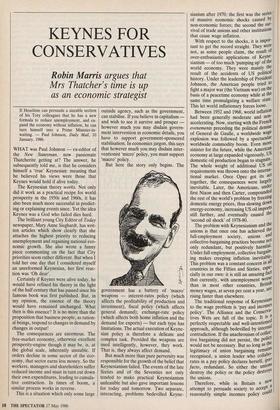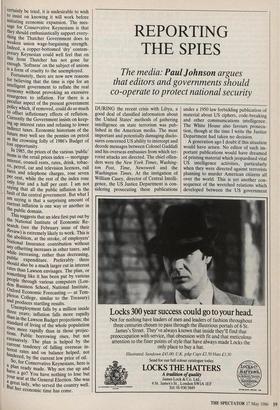KEYNES FOR CONSERVATIVES
Mrs Thatcher's time is up as an economic strategist
If Heseltine can persuade a sizeable section of his Tory colleagues that he has a new formula to reduce unemployment, and ex- pand the economy without inflation, he can turn himself into a Prime Minister-in- waiting. — Paul Johnson, Daily Mail, 10 January, 1986.
WHAT was Paul Johnson — ex-editor of the New Statesman, now passionate Thatcherite getting at? The answer, he subsequently told me, is that he considers himself a 'true' Keynesian: meaning that he believed his views were those that Keynes would hold if alive today.
The Keynesian theory works. Not only did it work as a practical recipe for world prosperity in the 1950s and 1960s, it has also been much more successful in predict- ing or explaining events since. Yet the idea Keynes was a God who failed dies hard.
The brilliant young City Editor of Today newspaper, Mary Anne Sieghardt, has writ- ten articles which show clearly that she attaches the highest priority to reducing unemployment and regaining national eco- nomic growth. She also wrote a funny piece commenting on the fact that City priorities seem rather different. But when I told her one day that I considered myself an unreformed Keynesian, her first reac- tion was 'Oh dear'.
Certainly if Keynes were alive today, he would have refined his theory in the light of the half century that has passed since his famous book was first published. But, in my opinion, the essence of the theory would have remained unchanged. What then is this essence? It is no more than the proposition that business people, as ration- al beings, respond to changes in demand by changes in output!
The consequences are enormous. The free-market economy, otherwise excellent prosperity-engine though it may be, is, at the global scale, inherently unstable. If orders decline in some sector of the eco- nomy, that sector earns less money. So the workers, managers and shareholders suffer reduced income and must in turn cut down their own expenditures, leading to cumula- tive contraction. In times of boom, a similar process works in reverse.
This is a situation which only some large outside agency, such as the government, can stabilise. If you believe in capitalism and wish to see it survive and prosper however much you may disdain govern- ment intervention in economic details, you have to support government-sponsored stabilisation. In economics jargon, this says that however much you may disdain inter- ventionist 'micro' policy, you must support `macro' policy.
But here the story only begins. The government has a battery of 'macro' weapons — interest-rates policy (which affects the profitability of production and investment), fiscal policy (which affects general demand); exchange-rate policy (which affects both home inflation and the demand for exports) — but each type has limitations. The actual execution of Keyne- sian policy is therefore a delicate and complex task. Provided the weapons are used intelligently, however, they work. That is, they always affect demand.
But much more than pure perversity was responsible for the growth of the belief that Keynesianism failed. The events of the late Sixties and of the Seventies not only tended to make practical Keynesianism unfeasible but also gave important lessons for today and tomorrow. Two separate, interacting, problems bedevilled Keyne- sianism after 1970: the first was the series of massive economic shocks caused by non-economic forces; the second the sur- vival of trade unions and other institutions that cause wage inflation.
With respect to the shocks, it is impor- tant to get the record straight. They were not, as some people claim, the result of over-enthusiastic applications of Keyne- sianism — of too much 'pumping up' of the world economy. They were mainly the result of the accidents of US political history. Under the leadership of President Johnson, the American people tried to fight a major war (the Vietnam war) on the basis of a peacetime economy while at the same time promulgating a welfare state. This let world inflationary forces loose. Between 1952 and 1968, world inflation had been generally moderate and non- accelerating. Now, starting with the French evenements preceding the political demise of General de Gaulle, a worldwide wage explosion was followed by a spectacular worldwide commodity boom. Even more sinister for the future, while the American economy at large expanded vigorously, US domestic oil production began to stagnate; The whole weight of additional US on requirements was thrown onto the interna- tional market. Once Opec got its act together, the consequences were largely inevitable. Later, the Americans, under first Nixon and then Carter, compounded the rest of the world's problem by freezing domestic energy prices, thus slowing down energy-economy, increasing US oil imports still further, and eventually caused the `second oil shock' of 1978-80. The problem with Keynesianism and the unions is that once one has achieved the full-employment society, unions and, collective-bargaining practices become 110' only redundant, but positively harinfni. Under full employment, collective bargain' ing makes creeping inflation inevitable. This problem was a constant concern in all countries in the Fifties and Sixties, espe- cially in our own: it is still an amazing fact that currently, with unemployment worse than in most other countries, British money wages, at seven per cent a year, are rising faster than elsewhere. The traditional response of Keynesians to the wage problem is 'pay and incomes policy'. The Alliance and the Conserva" tives Wets are full of the topic. It is a, perfectly respectable and well-intentionea, approach, although bedevilled by internal contradiction. If the anachronism of collec- tive bargaining did not persist, the policy would not be necessary. But so long as the legitimacy of union bargaining retrial° recognised, a union leader who collabo- rates in a pay policy declares herself, iPs° facto, redundant. So either the union destroy the policy or the policy destroys the unions. Therefore, while in Britain a new attempt to persuade society to acceP 68 reasonably simple incomes policy CO certainly be tried, it is undesirable to wish to insist on knowing it will work before initiating economic expansion. The mes- sage for Conservative Keynesians is that they should enthusiastically support every- thing the Thatcher Government does to weaken union wage-bargaining strength. Indeed, a copper-bottomed 'dry' contem- porary Keynesian could well feel that on this front Thatcher has not gone far enough. 'Softness' on the subject of unions is a form of cruelty to the unemployed. Fortunately, there are now new reasons for believing that the time is ripe for an intelligent government to reflate the real economy without provoking an excessive resurgence to inflation. For there is a peculiar aspect of the present government policy which, if removed, could do so much to offset inflationary effects of reflation. C. urrently the Government insists on keep- ling up interest rates and refusing to lower indirect taxes. Economic historians of the future may well see the pennies on petrol as the crowning folly of 1986's Budget of lost opportunity. In 1985, the prices of the various 'public' items in the retail prices index — mortgage Interest, council rents, rates, drink, tobac- co, petrol, car and television licences, rail fares and telephone charges, rose seven per cent, while the rest of the index rose only four and a half per cent. I am not saying that all the public inflation is the fault of the central government. But what I am saying is that a surprising amount of current inflation is one way or another in the public domain. This suggests that an idea first put out by the National Institute of Economic Re- search (see the February issue of their Review) is extremely likely to work. This is the abolition, at the stroke, of employers' National Insurance contribution without any offsetting increases in other taxes, and while increasing, rather than decreasing, public expenditure. Preferably there should also be a much larger cut in interest rates than Lawson envisages. The plan, or something like it has been put by various people through various computers (Lon- don Business School, National Institute, Oxford Economic Forecasting — at Tem- pleton College, similar to the Treasury) and produces startling results. Unemployment falls by a million inside three years; inflation falls more rapidly i than in the Lawson Budget projections; the standard of living of the whole population rises more rapidly than in those projec- tions. Public borrowing rises, but not excessively. The plan is helped by the urrent tendency of falling overseas m- erest rates and on balance helped, not hindered, by the current low price of oil. So, for Conservative Keynesians, here is .a plan ready made. Why not rise up and have a go? You have nothing to lose but Your seat at the General Election. She was a_ great lady, who served the country well. But her economic time has come.



















































 Previous page
Previous page